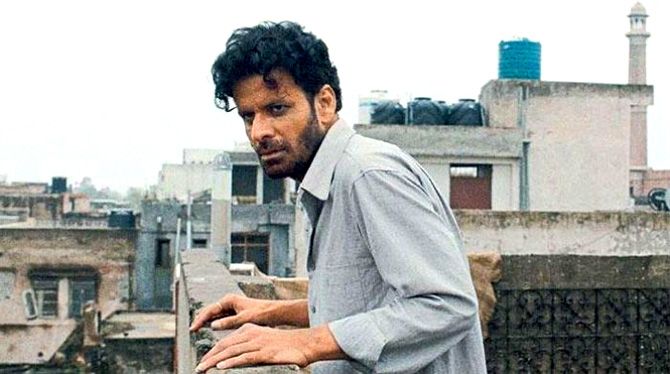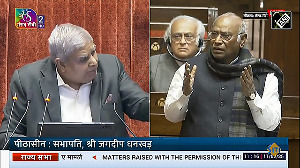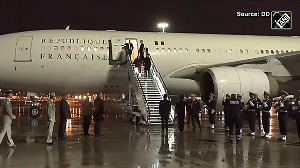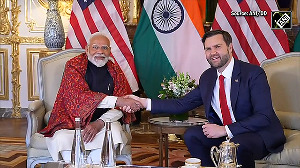'The overarching fact of modern social behaviour isn't that we are irresponsible women and men, but that we are never quite sure, when and how to act responsibly.'
'This is the real side of every Twitter outrage, where those who tweet about stories of 'unreported domestic abuse' end up feeling superior to those neighbours who are summoned up as clueless witnesses.'
'This view of the supposed spiritual decay of our times, which is at the core of Gali Guleiyan, is thus more fashionable than perceptive,' says Sreehari Nair.

Dipesh Jain's Gali Guleiyan whittles the world down into countless lanes, and suggests that in every lane is a man looking to escape.
Jain's film is the story of Khuddus (Manoj Bajpayee) -- one such man, living in one such lane, somewhere in lowbrow Delhi.
Broadly, the film is also about Idris (Om Singh), a boy plotting his escape from the same lane where Khuddus lives -- this is a boy Khuddus wants to help.
The editing of Gali Guleiyan shows us that the man and the boy are linked by a dubious habit: Scopophilia or the tendency to spy on people with an intention of studying human nature.
Bearded, shower-deprived, and sweaty, Khuddus lives removed from society, in a ramshackle place, which is not easily accessible, and once accessed not easy to navigate.
In a neighbourhood where cables and wires overlap and crisscross to re-craft the skyline of the locality, Khuddus has installed a series of cameras that capture the goings-on in his lane.
Street fights.
Domestic infidelities.
The rhythms of everyday banalities.
From his inaccessible, unnavigable place, Khuddus watches it all -- his home, you soon realise, is a fence built around his impulse.
This is a man whose dedication to spying is close to mystic. He goes to namaaz sessions but abstains from praying; scopophilia is his religion, it may even be his form of religious abnegation.
Gali Guleiyan opens with a quote by William S Burroughs: 'There are no innocent bystanders ... what are they doing there in the first place?' But the film and its central character can be better explained by another quote, also by Burroughs: 'A paranoid may be the only man who knows at least a little of what's going on.'
The images reaching the monitors in his home may be of the 'Reality Show' variety, but Khuddus is a social anthropologist with the ethics of a strict Lutheran minister; what he gleans from the images is the rot that invades modern society.
If Khuddus spies electronically, the boy, Idris or Idu, is an old-fashioned peeper.
He plays the ritual of peeping into neighbours' bedrooms like a child plays 'tag'.
Now on the edge of adolescence, we watch him stride into a VCR shop with his best friend and as the two are ushered in, we expect a nudie movie to start playing.
But to our shock, we watch the young Idu getting excited by a scene from Vidhu Vinod Chopra's Khamosh in which Shabana Azmi is scared stiff by the figure of an approaching man.
The boy is perhaps a young Hitchcock: He experiences ogling, danger, and pleasure as one thing.
Through quick glances, Idu constructs in his head, the lives of adults around him. He is peeping into minds, into the ways of the adult world.
While working at his father's mutton shop, it is the countenances of his clients that Idu studies and not the flash of the butcher's knife.
Once the knives have done their job, Idu comes home to a mother (a terrific Shahana Goswami) who smothers him with kisses, and a father (Neeraj Kabi) who works meticulously to break his will.
This tango of affection and intense fear plays out on loop and we are shown how the sweat, which covers Khuddus' face at all times, slowly becomes a permanent feature of young Idu's face.
Idu's pride is that he can read human beings beyond the popular versions that are floating about them. This is Khuddus' pride too.
Idris, in Persian, means The Interpreter; Khuddus is The Wise One.
Gali Guleiyan is about a boy forced to live his tragedy over and over again, and a man who commits to a lifestyle that will reinforce his tragedies.
The boy, who is staring into a future beyond the lane, is denied escape; and the man, gazing back into his past, cannot bring himself to escape the lane.
Part of the experience and also the frustration of watching Guli Guleiyan is overlooking the heavy sense of importance the movie assigns to itself and acknowledging Dipesh Jain's virtuosic control over film craft and his unique (though not entirely satisfying) artistic sensibility.
The soot and the dirt inside Khuddus' home suggest dreams gone to dust.
The chiaroscuro lighting suggests remembrance of all things past.
When Idu fights with his father over his father's mistreatment of his mother, Jain stages it like a fight of equals -- they are less like father and son, and more like two men fighting over a woman!
Here's a director who understands the music in casual violence.
Manoj Bajpayee's Khuddus is going clinically insane, but his doctor, an old, wise man, softens the prognosis by asking him about his physical details: The wound on his hand, his thin frame, his sleepy eyes etc.
Here's a writer who knows how acts of small kindnesses can add extra dimensions to a simple scene.
Idu wants to know who buried his stillborn brother. When he is told that it was his father who performed the ritual, it strengthens the boy's conviction that the butcher treats human bodies like pieces of dead meat.
Trivial family conversations with Gothic undertones -- this Jain can develop characters in the most ticklish ways.
Though devised at the script level, the final editing by Chris Witt is majorly responsible for taking us inside the ruins of Khuddus' mind.
When the narrative leaps from Manoj Bajpayee's Khuddus (who may have aged beyond his years) to the young Idu, the almost Buddhist score fades into sounds from real life.
You are then pulled out of a dark dream and thrust into an even darker reality.
Although there is a lot to be said about Dipesh Jain's grasp over a specific kind of psychological aberration, where he slips badly is in his attempt to fuse this aberration with his bigger theme.
The film talks about the culpability of the silent bystander in the face of abuse; but we never see any bystanders with any real power to change either Khuddus' or Idu's story, and so the dramatic possibilities of the theme remain completely unexplored.
At a higher plane, the insulated dystopia of Gali Guleiyan's central character, feels like yet another excuse for rolling out the whole Where-is-this-world-coming-to Editorial that is usually a starting off point for speeches about our indifference to human suffering.
But this view is fairly self-congratulatory and nothing too new.
Part of the sad comedy of living in the modern world is that often we don't know when our help is needed, just as others may not know when we need help.
The overarching fact of modern social behaviour isn't that we are irresponsible women and men, but that we are never quite sure, when and how to act responsibly.
This is the real side of every Twitter outrage, where those who tweet about stories of 'unreported domestic abuse' end up feeling superior to those neighbours who are summoned up as clueless witnesses.
This view of the supposed spiritual decay of our times, which is at the core of Gali Guleiyan, is thus more fashionable than perceptive.
And it's when you assent to this chic concern at the centre of it that the movie's many clevernesses and its treatment of its oppressed character will seem to you rather sadistic.
The virtuosic cinematic craft, especially the brilliant editing, then feels like the foremost proponent of this sadism.
It is Manoj Bajpayee's performance as Khuddus that suffers the most from the film's shut-in, sanctimonious worldview.
Bajpayee is here, clearly, reaching down into his own emptiness to convey extreme physical states: Fear, pain, exhaustion. But in this insulated, airless setting, his character comes off as a man trying to scream into a vacuum.
Notwithstanding the twitch on his face which arrives unannounced, his performance seems a tad too worked out in advance.
This would have been a great turn in a one-actor play, but in a movie that wants to lay bare the coldness of society, Bajpayee's character does not speak to us as directly.
The performance spares our feelings and does not intensify them. Khuddus is like a train wreck that diligently keeps making all the stops.
Neeraj Kabi, father to Idu, butcher/child-beater, plays a despicable person, straight.
I have always thought Kabi brilliant but distant.
What we get with actors like Kay Kay Menon and Adil Hussain (and don't with Neeraj Kabi) is certain tenderness even about characters who make the lives of those around them unlivable.
Kabi, as with his role here, turns despicability into full-blooded evilness. He doesn't humanise such characters; but creates out of them templates for great superhero villains. (Given the number of people who consider superhero movies 'great art', this may not be that impractical an approach though).
Shahana Goswami, on the other hand, brings history, and even toughness, to what is essentially a soft, syrupy character.
Talking to Idu in that nasal old-world girl tone, she vividly evokes her past (all the while doing her little tricks -- Dard becomes Darrrd), and then lets you link that with her initial domestic scenes, thus presenting to you a 'rich and full character'.
The key to her performance is that she never tries to overwhelm you, only reveal more of herself to you.
It is young Om Singh as Idu, who gradually becomes the film's face and also its silent narrator -- teaching you, in effect, that getting older is learning new ways in which one is helpless.
Idu's face tightens as Neeraj Kabi discloses to Shahana Goswami that the stillborn baby has been buried, and you feel like you have watched the boy grow up in that one scene.
It is a marvelous performance and one that is given all the resourcefulness that Bajpayee's Khuddus lacks.
Idu is Robinson Crusoe Jr and nothing that Khuddus does (including sewing his bruised hand himself), suggests anything like the imagination that the boy shows.
How do you sympathise, beyond a point, with a character like Khuddus, who merely sits there wallowing in his own spiritual excrement? This is a question that the movie isn't able to get its audience interested in -- let alone begin to answer.
We all live inside our heads to some extent, but Gali Guleiyan, in turning this into a condition specific to Khuddus and then cutting him off from the world completely, foreshortens our vision than enlarge it.
While plumbing psychological depths with some ingenuity, the movie never really broadens its horizon.
So you ask yourself, 'If Khuddus or Idu were to escape the lane, what would they be escaping to?'
Pauline Kael once said about Satyajit Ray: 'Ray sees that life itself is good no matter how bad it is. It is difficult to discuss art which is an affirmation of life, without fear of becoming maudlin. But is there any other kind of art, on screen or elsewhere?'
When looked at through Dipesh Jain's eyes however, life itself seems pretty bad; it seems almost to be a defence against charges of maudlinism.
This means that for all its Bressonian cold brilliance, and its talent for giving us spatial dislocation, what we don't feel in Gali Guleiyan -- and this is what we should have felt -- is the horror of being ineffectual.
Through Khuddus' attempts to respond to young Idu's cries for help, I was reminded of a moment in Saul Bellow's The Dean's December, where the lead character, upon hearing a dog cry incessantly, surmises that the dog is saying, 'For God's sake, open the universe a little more!'
This was the appeal that escaped my throat by the end of Gali Guleiyan.
It was as much a protest against Dipesh Jain's cinematic approach and his worldview, as it was an objection to Khuddus' constant self-pitying.
'This is all good; but for God's sake, can you open the universe a little more?'












 © 2025
© 2025